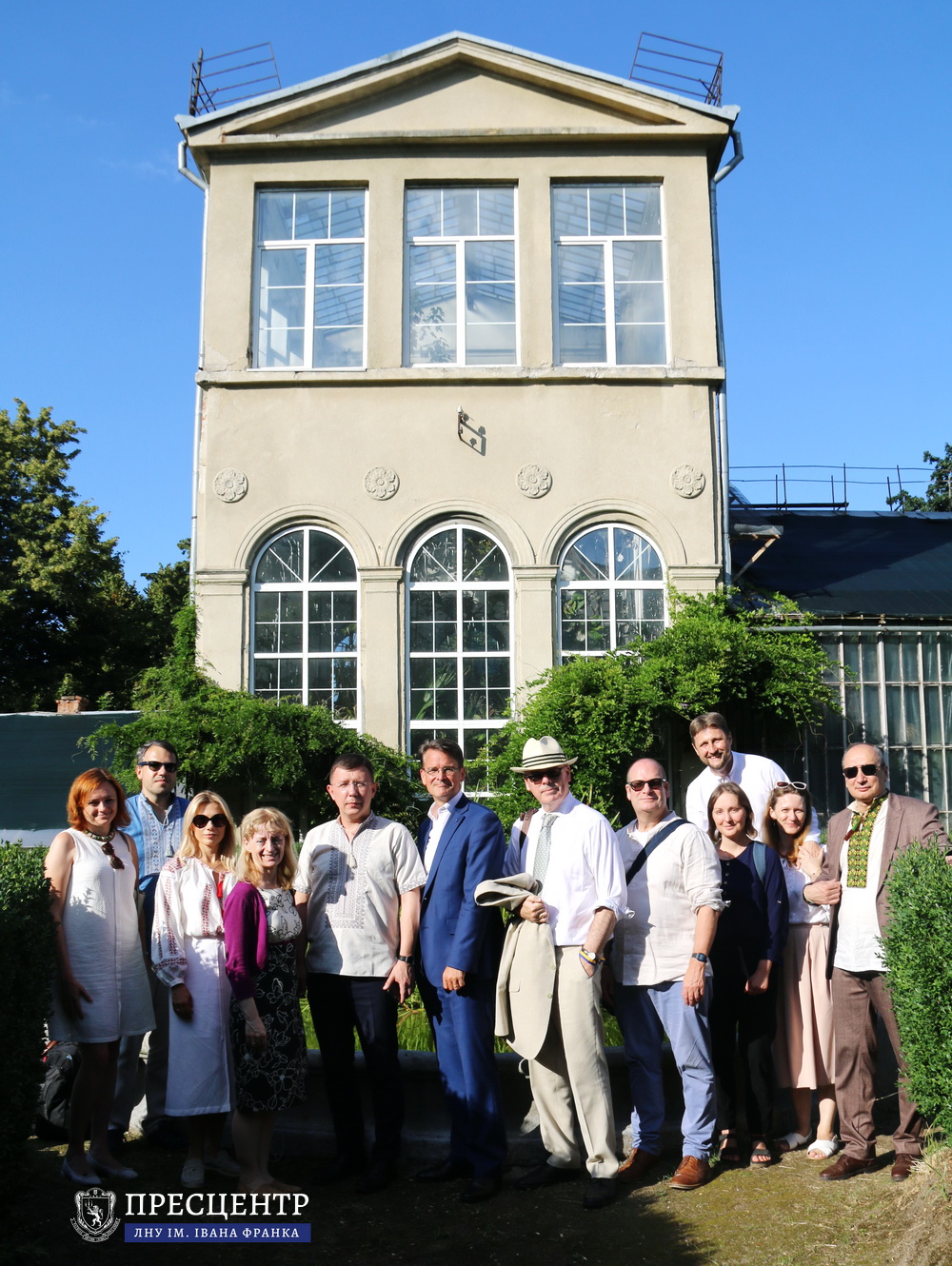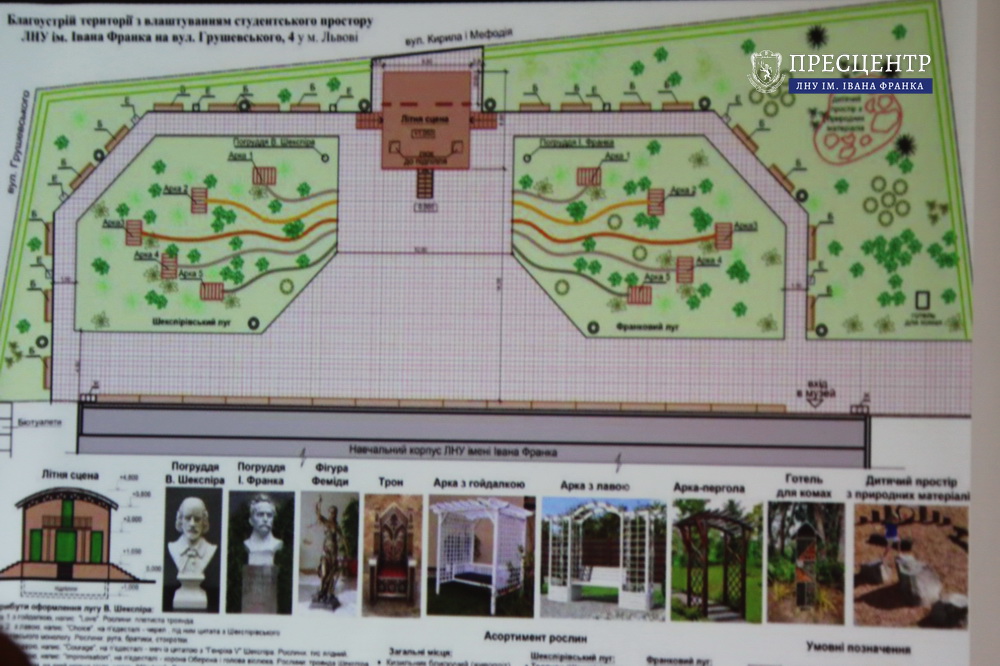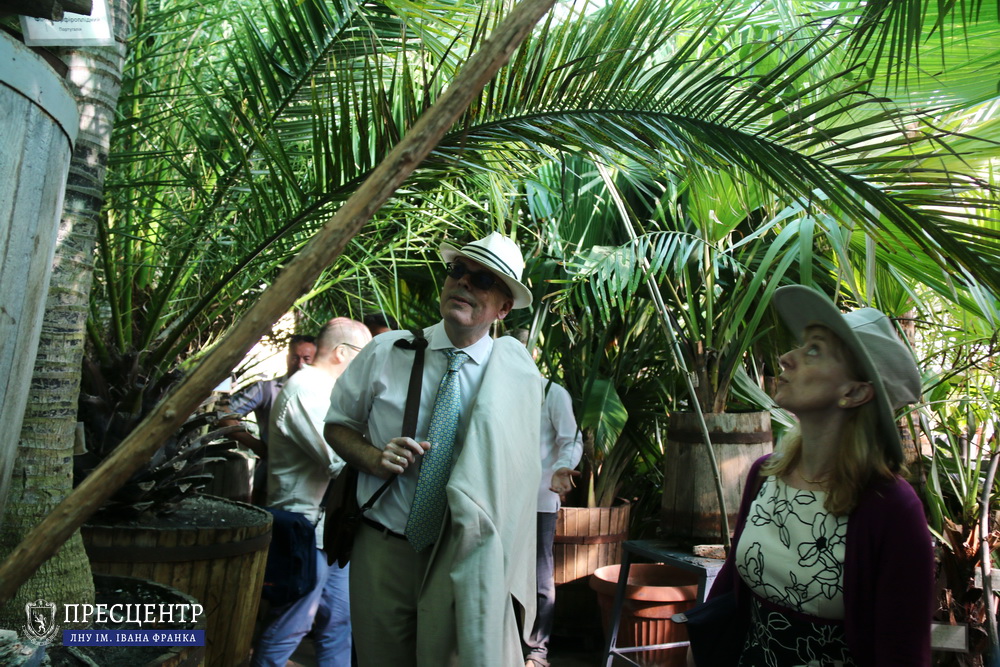
On 24 August 2023, the Faculty of Culture and Arts of Ivan Franko National University of Lviv hosted a discussion of the Shakespeare_Franko_Garden project, one of the initiators of which was the Dean of the Faculty of Culture and Arts, Mayya Harbuzyuk, who passed away on 14 August 2023. The presentation of the initiative was attended by representatives of the administration of Ivan Franko National University of Lviv, the students and academic community of the Faculty of Culture and Arts, as well as members of the delegation from the University of Birmingham (UK), who were visiting Lviv University.
The meeting was opened by Myroslava Tsyhanyk, Deputy Dean of the Faculty of Culture and Arts for Academic Affairs. “We are a young faculty, only 20 years old, but all this time we have been working to create a talented artistic community in our country. Unfortunately, on the way to success, we also suffer losses, in particular, the last loss – the passing of our dean – was a heavy blow to the entire faculty community. Now we are responsible for the blessed memory of Mayya Harbuzyuk and must continue her important work and worthy endeavours,” Myroslava Tsyhanyk stressed and invited the audience to listen to the students of the Faculty of Culture and Arts performing William Shakespeare’s sonnets in Ukrainian.
Later, Professor Michael Dobson, Director of the Institute of Shakespeare Studies at Stanford University, shared his fond memories of Mayya Harbuzyuk and also told the audience about the idea of Shakespearean gardens. According to Michael Dobson, a Shakespearean garden is a themed garden that grows plants that are mentioned in the works of William Shakespeare, as well as plants that were typical of the Elizabethan era in general. A Shakespearean garden usually contains several dozen plants, either planted in a herbaceous variety or in geometric shapes separated by boxwoods. Plaques near the plants usually contain relevant quotations from Shakespeare’s works. The garden features paths, benches and a bust of Shakespeare.
“We talked a lot with Mayya about the importance of such gardens as bridges between nature and culture. Shakespearean gardens are symbols of the germination of immortal words, meanings and ideas, and the rebirth of things that are important to us. During the last weeks of our correspondence with Mayya, which unfortunately turned out to be the last weeks of her life, she sent me ideas for creating a unique project called Shakespeare_Franko_Garden in Lviv, and prepared proposals for plants that could grow there. She wanted a space in the middle of this garden where talented students could showcase their performances. I am very happy that this project will be implemented. It is a great tragedy that Mrs Mayya will not see the Shakespeare_Franko_Garden concept come to life, but I believe that the plants that will be planted in this place will soon flourish in a peaceful and independent Ukraine,” Michael Dobson said.
Sofia Rosa-Lavrentiy, Associate Professor of the Department of Theatre Studies and Acting at the Faculty of Culture and Arts, told more about the concept and plan of the Shakespeare_Franko_Garden project. “The history of Shakespearean Garden in Lviv has been maturing gradually. However, it began with our first visits to the United Kingdom, first by Mayya Harbuzyuk, and then – by other teachers of the Department of Theatre Studies and Acting. At first, we dreamed of a small Shakespearean garden in Lviv, then, with the support of the administration of our University, in particular Serhiy Riznyk and Rector Volodymyr Melnyk, we began to plan a larger garden. At some point, our Rector suggested that this idea should combine the British and Ukrainian garden traditions through the great cultural figures Shakespeare and Franko,” said Sofia Rosa-Lavrentiy.
According to the project concept, Shakespeare_Franko_Garden is to be divided into two parts: Shakespeare’s and Franko’s valleys, with a stage between them. In each part of the park, it is planned to create 5 thematic arches with inscriptions: “Love”, “Choice”, “Courage”, “Creativity” and “Wisdom”, because it was through these ideas that the characters in Shakespeare and Franko’s works changed the world around them. For example, the arch “Love” will commemorate the play Romeo and Juliet in Shakespeare’s part and the characters Anna and Mykhailo from Stolen Happiness in Franko’s Valley. The second arch, titled “Choice”, will quote Hamlet from the play of the same name and Yevhen Rafalovych from Cross paths. The third arch, “Courage,” will depict Maksym Berkut from Zakhar Berkut and probably Henry V from the novel of the same name. The fourth arch, “Creativity,” will feature Shakespeare’s A Midsummer Night’s Dream and Franko’s Fox Mykyta. According to the plans, the characters of the fifth arch, “Wisdom”, will be King Lear and Moses. In each arch of the garden, plants that appear on the pages of the respective works of Shakespeare and Franko and are well suited to the chosen themes will be planted.
“Someone might say that it is strange to plant a garden in times of war, but in difficult times we need space for beauty, good thoughts, and good ideas that come from good cooperation even more. We are also planning to create a corner of Mayya Volodymyrivna in this garden, with her favourite flowers around,” Sofia Rosa-Lavrentiy summed up.
At the end of the meeting, Olha Hryb, a student of the Faculty of Culture and Arts, performed Ukrainian songs for the guests from the UK, demonstrating her inspired bandura playing. The Ukrainian musical instrument interested the Birmingham colleagues so much that they tried the bandura’s strings for their sonority.
Afterwards, the event participants went on a tour of the Lviv University Botanical Garden to see the site where the Shakespeare-Franko Park will be located in the future.

